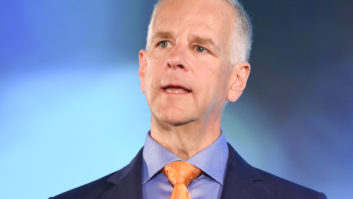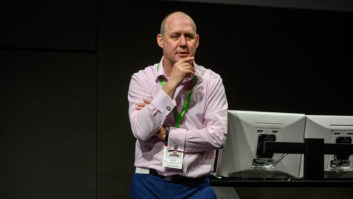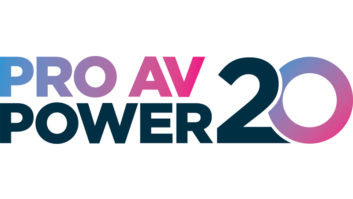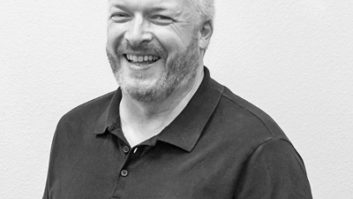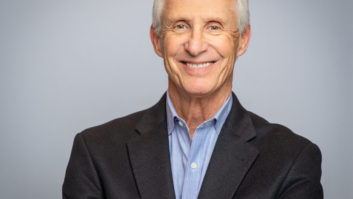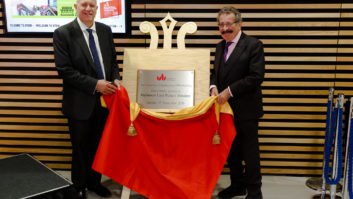#4: David Labuskes, CEO, AVIXA
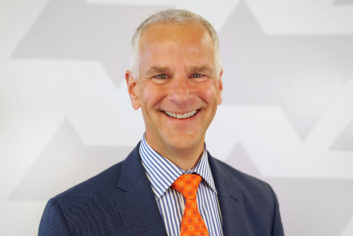 How did you first get involved in the AV marketplace?
How did you first get involved in the AV marketplace?
I was leading the technology design studio at RTKL Associates (an architectural and engineering firm) in the early 2000s as IT and AV began converging on a shared infrastructure. At that time, I began an AV consulting practice and ultimately recruited many of today’s thought leaders from around the world. I was introduced to AVIXA (InfoComm at the time) through this affiliation, and then ultimately worked with them as a volunteer at BICSI to co-publish the Audio Visual Design Reference Manual in 2006.
When my predecessor announced his retirement in 2012, I considered the position as CEO of AVIXA to be a perfect blend of opportunities to continue to work for the betterment of an industry through volunteers and to continue to engage with technology that changes the world as a full-time job. The rest is, as they say, history.
What would you say are the most significant changes/developments to have taken place in the industry during your time?
The movement of signal transport from analogue to digital format has enabled a sea-change in the ubiquitous adoption of AV around the world. It has affected every aspect of the industry from display technology to controls and audio and even peripherals. It is the foundation of unified communications, cloud computing, AVaaS, and will be the starting point for the further adoption of artificial intelligence, virtual reality, augmented reality, and much of what we can’t even imagine today.
What personal and professional achievements are you most proud of?
Being included on the Pro AV Power 20 list? Personally, I am terribly proud to be a husband to an extraordinary woman who amazes me every day for over 20 years and a father of two young men that will change the future of our world.
Professionally, I take enormous pride in both my current team at AVIXA and so many incredibly talented and bright people that I’ve been able to convince to be a part of my team throughout my career. These professionals are industry leaders and could have worked anywhere but chose to be a part of my team. When I look at what they have, are, and will accomplish over their careers, it humbles me to think that I might have had some small measure of influence on those accomplishments.
And finally, I take immense pride in having had the privilege and honour to lead AVIXA during this time of Covid-19. The challenges faced by our industry already and those to come are precisely the reason for an industry association to exist. The responsibility is heavy for all our staff and volunteer leadership – and they have continued to meet that challenge fearlessly, selflessly and with, in my humble opinion, grace and resolution.
Do you have a philosophy that you live by professionally? If so, what is it and how has it benefitted your career, those around you, and the wider market?
One of my best friends introduced me to The Servant by James Hunter many years ago. I would hope that this would be how I was remembered or described. I have strived to always be in a room that is full of people smarter than me (not terribly hard to do). One other guiding principle that I try to always keep in mind was described by US President Harry Truman: “It is amazing what you can accomplish if you do not care who gets the credit.”
Benefitting my career: being surrounded by fun, creative people who are passionate at what they do and having amazingly fun and cool toys called AV. How can that be called work?
People debate culture versus strategy all the time. In my perspective, they’re both wrong. Talent will eat strategy’s lunch every day. And culture is simply the product of the talent you attract. Truly talented people rarely need to tell you how good they are. They don’t need to prove anything. They just want the freedom to do what they love. If you define success as helping them be successful, as a leader, you can’t be beat.
In terms of the wider industry: the more effective that AVIXA is at delivering on our mission, the more the industry will be served. When I think of the calibre of people who have served on our board of directors, I’m certain that we are doing good for the industry at large. When I look at the community at our trade shows, educational events, or in our membership, I can’t help but believe that the industry is in a far better place having had AVIXA as an industry association (in many names) since 1939. For now, I see myself as a steward of that responsibility.
Prior to the outbreak of the global pandemic, what would you say were the biggest areas of technological or operational challenge for the AV industry?
A challenge our industry faces is efficiently meeting exponential growth demand with scalable solutions that are technically sound. Almost every part of that phrase is important. Much of our industry is still operating within outdated business models. This leaves vast inefficiencies in the supply chain that the marketplace will ultimately solve. The growth of AV is reinforced by a network effect of more demand means more implementation, which in turn, drives even more adoption and demand. And I’ll take a moment to clarify something here. That demand is for experience and for connecting people – it is fulfilled with the competent deployment of technological solutions. This in turn creates a demand for upskilling our workforce and ensuring that they can deliver in a mature technological ecosystem – what some call IT.
What impact has the pandemic had on you and your business, and what do you think will be the longer term impact of this extraordinary period on our sector?
The positivity during this time is AVIXA is having better engagement and a deeper connection with our members than in years past. There’s empathy, trust, and an outpouring of community that is benefitting AV professionals around the world.
The negative impact is that a significant amount of the association’s revenue is based on events that gather 50,000-plus people. The cancellation or delay of those events and the uncertainty of future events contributes to the same level of demand for us to be innovative and pursue new opportunities like the rest of industry.
In your opinion, what will be the biggest driver(s) of change for the AV market in the next five years?
As stores, restaurants, hotels, and other venues all open again, they are going to be attempting two things in parallel. One is to ensure and validate those who are in those establishments have made good decisions about being there. Two, they’ll need to go even further to enhance the patrons’ experience of being in those spaces versus opting to make online purchases, cook at home, or reduce travel. The same goes for sporting events. How do you entice fans to head to the stadium instead of watching the game from home on TV? For each and every one of these public interactions, there is now a driver to encompass a level of safety into the experience. People simply will not go anywhere they don’t feel safe and although safety cannot be controlled everywhere, the environment created can be.
There will be enormous opportunity for the AV industry, with respect to bringing virtual engagement into the physical space. There’s a lot of talk right now about virtual engagement and it’s really not that complicated. It’s cameras, good headsets, and displays. What’s really complicated is overlaying virtual with physical. We have figured out how to connect the back of the room to the stage, and now it is time to extend the back of the auditorium to the next town and even the next country – and bring that connection back to the stage. It comes back to the relationship between content, space, and technology. The content and technology need to evolve to recognise that not everyone is in the same physical space.
Finally, what would be your message to those starting out their careers in the AV community?
- Do not compromise on technical competence, but do not rely upon it alone. Recognise that any reasonably smart and disciplined person can be technically competent. AV is about the science and the art and bringing them together. It’s about technical expertise applied to connecting people together. And with that, you can change the way people experience the world.
- Take risks. Put it all on the line at least once. And if you don’t love what you’re doing, discover what it is missing and find a way to bring that into your life.
- Work harder than anyone around you. And if you’re not loving it, then see rule number 2.
Quickfire round
Who’s had the greatest influence on your career?
My wife. She’s believed in me when I haven’t. She’s inspired and freed me to take risks as a role model and a partner. When I met her, she was my client and was taking no prisoners from the IT department for whom I consulted at the time. By the time we went on our first date, she had already made me a better project manager. And since that time, she’s never let me accept less from myself than I could give.
Who did/do you look up to as a role model professionally?
In my personal and professional life, I follow the teachings of Jesus Christ. He is my role model above all.
How do you measure success?
Through the learning, fulfilment, achievement, and growth of others I’m associated with.
What’s your biggest professional regret?
Taking a $4,000 payment for writing code instead of a 10 per cent equity stake in a start-up that was ultimately worth a $100 million.
If you were a teenager today, what profession would you go into?
Epidemiology
